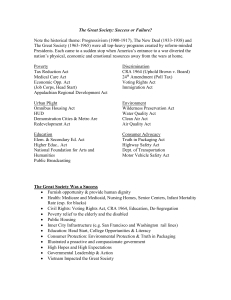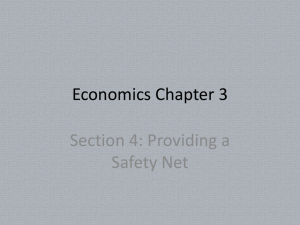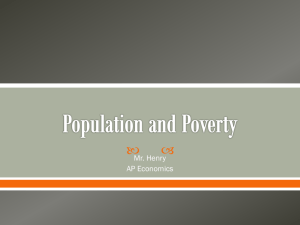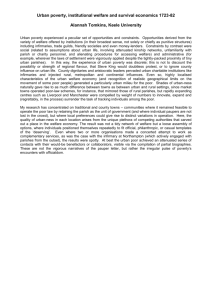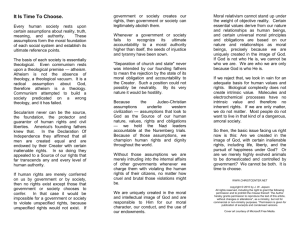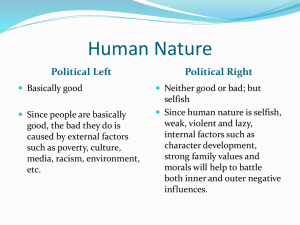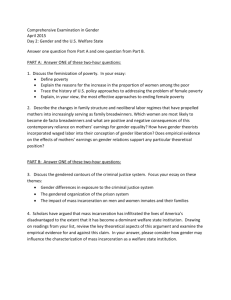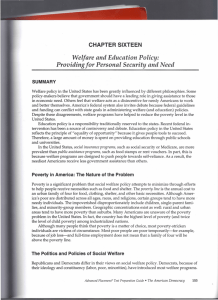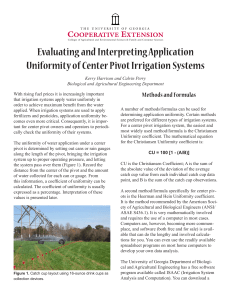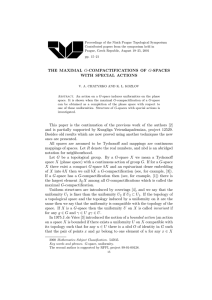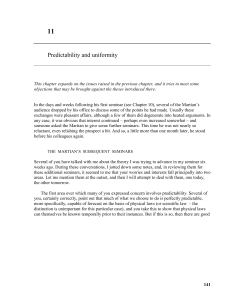Exploring Social Policy presentation
advertisement
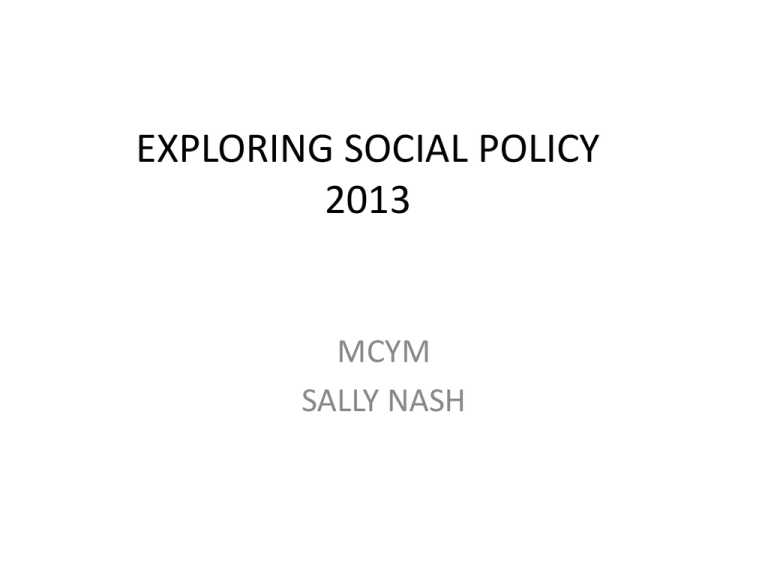
EXPLORING SOCIAL POLICY 2013 MCYM SALLY NASH What do you know? • http://ukcitizenshipsupport.com/chaptertest/chapter-testfeq/ If you were devising a test for citizenship for children and young people what would you include? How does social policy impact –Your life? –The life of children and young people? –Your practice? –Future employment prospects? –Churches –Christian organizations… What is social policy? A policy is a course or principle of action adopted or proposed by a government, party, business or individual A social policy is defined as a deliberate intervention by the state to redistribute resources amongst its citizens so as to achieve a welfare objective (John Baldock, Nicky Manning, Sarah Vickerstaff, eds, Social Policy, 2nd ed. Oxford, Oxford University Press, 2003, p.xxi) What is social policy? • Social policy entails the study of the social relations necessary for human wellbeing and the systems by which wellbeing may be promoted. It’s about the many and various things that affect the kinds of life that you and I and everyone can live (Dean, H. 2012. What is Social Policy? 2nd ed. Cambridge Polity Press, p1). However: • The main determinants of welfare are economic • The government’s role in diverting resources into social policies is linked to or dependent on the economy • Social policies will be determined by views about how the economy does or should operate But: A range of other issues affect the concept of welfare for an individual including: • Individual action • Job opportunities • Support from family and friends • Activities of non-state institutions such as churches, charities, community organizations, trade unions etc • Religious faith Three influencing factors • Conceptions of citizenship • Concepts of justice • Entitlements and obligations Functions of the services or benefits of the Welfare State 1 2 3 4 5 6 As partial compensation for identified disservice caused by society and the disservices caused by international society As partial compensation for unidentified services caused by society As partial compensation for unmerited disability As a form of protection for society As an investment for future personal or collective gain As an immediate and/or deferred increment to personal welfare Poverty The composition of those in poverty is very different today than 10 or 20 years ago. The proportion of pensioners in poverty has halved since the early 1990s, while that of working-age adults without children has risen by a third. Over half of children and working-age adults in poverty live in a working household. In-work poverty has been rising steadily for at least a decade. Some 6.4 million people now lack the paid work they want. There are 1.4 million part-time workers wanting full-time work – the highest figure in 20 years. The welfare cuts so far are likely to hit low-income households more than once, through changes to both income-related and housing benefits. Changes to disability benefit could mean low-income disabled people being hit even harder. • http://www.jrf.org.uk/sites/files/jrf/poverty-exclusion-government-policy-summary.pdf Making policy for children and young people 1 Divide into four teams 2 Each team draws up a list of five policies that they think would improve the situation for children and young people in society. Assume as a policy maker you have unlimited power to implement your policy. 3 A combined list of twelve policies is then drawn up with each group contributing a policy in turn until the list is complete. This list needs to be able to be seen by all groups. •4 In your teams you need to look at the combined list and try to decide which policy will be most popular with the other teams playing the game. Each team picks one. Write down the number on a piece of paper so it can be seen by other teams when you hold it up. 5 Scoring for teams is as follows: You score points in each round depending on how many groups picked the same policy as you did. 6 Once the round is completed, the most popular policy is written on a new list and crossed off the common list. •7 Repeat the process. If there is a tie each team needs to argue for its policy and the teams vote again. •8 To find out who won add up the scores from the rounds. The highest score wins and this is the team with the best feel for public opinion on an issue. This team is the policy maker. 10 Another winner can be found by looking to see which team had most policies in the final list. This team is the problem solver. Discussion: What are some of the issues around social policy that have emerged from this game Ways of Analysing Policy • Intentions and objectives of the policy • Administrative and financial arrangements • Outcomes – particularly in terms of gains and losses (Baldock et al p7-16) Intentions and objectives Redistribution – from those who have more to those who have less…. Robin Hood function – fairness and justice. Market failure - free schooling or pensions Risk management – from harm people face over life – childhood, sickness, old age, unemployment, environment Reducing social exclusion –contested term, alternative word for poverty or those who have slipped through the net of services provided – threat to stability and security Administrative and financial • Need to set up procedures and organizations to carry out social policies • Regulation – seat belts, alcohol and tobacco selling, food hygiene etc • Providing services in kind eg healthcare and education • Privatization and contracting out • Direct and indirect taxation Outcomes • Is the intention less important than what is actually achieved? Five reasons why aims and outcomes may differ and why policies may ‘fail’: Inadequate policy formulation Poor structural implementation Poor (or even subversive) practice The intervention of unforeseen external circumstances The stated or overt aims were not the real intentions, instead outcomes concur with covert aims Case Study – Viagra and the NHS The publicity surrounding Viagra has generated a felt need. Interestingly, however, it has also led to much more expressed need by legitimizing a request that had previously been highly stigmatized. There has also been a strong element of comparative need in this debate – people may have access to it in some countries or areas but not in others. The debate here is also very much about normative need and about who should be the arbiter of need: government, medical professionals or consumers? Reference: J Baldock et al, 2003. Social Policy Oxford: OUP, p111-3. Trends Increase individual and private responsibility Move from public to private provision Market principles Punishment and control in youth justice Less provision more management and regulation From benefits to work or training Political perspectives Take one of these tests… • http://www.politicalcompass.org/test • http://www.nolanchart.com/survey.php "The Left" "The Right" Socialists Greater Economic Uniformity (therefore less economic freedom) + Greater Social Uniformity (therefore less social freedom) = BIG GOVERNMENT Extreme version is communism Conservatives Greater Economic Freedom (therefore less economic uniformity) + Greater Social Uniformity (therefore less social freedom) = MEDIUM-SIZED GOVERNMENT Extreme version is the religious right ↑ S O C I A L ← ECONOMIC Liberals Greater Economic Uniformity (therefore less economic freedom) + Greater Social Freedom (therefore less social uniformity) = MEDIUM-SIZED GOVERNMENT Extreme version is hippy communes S C A L E ↓ "Traditional " SCALE → Libertarians Greater Economic Freedom (therefore less economic uniformity) + Greater Social Freedom (therefore less social uniformity) = LITTLE OR NO GOVERNMENT Extreme version is anarchism "Progressive " Letter from a Birmingham Jail • What are the key social policy, theological and political issues being raised in Martin Luther King’s letter? • What would you write in a letter to your fellow children/school/youthworkers? Public theology • • • • • • • • Liberation Liberationists know that the only God worth worshipping is biased in favour of the oppressed, and that truly pious living involves active social engagement for and advocacy of their rights. Liberationists know that much of science, philosophy, and religion is an ideological construction designed to protect the interests of the powerful against the weak. Vocation God has a purpose for individuals and groups – the chief end of our lives is to serve God. Each sector of the common life is called by God to define, obey and enhance the specific values and purposes that are proper to it. Covenant Covenant relates to how we humans are to form communities of mutual responsibility as we live out our vocations. People require one another to be whole, and persons in community require a shared framework of common moral obligation that provides the principles by which to structure these relationships. Moral Law Moral law attempts to answer the question “Is there right and wrong?” A public theology will hold that there are universally valid moral laws rooted in God. The United Nations Declaration on Human Rights is an attempt to articulate a universal moral law. • • • • • • • • • • • Sin We encounter distortion, brokenness, corruption, and failure within ourselves and in every sociohistorical context. Freedom Human freedom is the answer to the question of how sin entered the world if God created it. Need to note distinctions between sin and crime. A public theology will always work indirectly. It will attempt to persuade people to exercise their cultural, social, political and economic freedom responsibly through pluralistic institutions allowing governments to constrict those public behaviours that are a clear threat to human rights or the common good and that cannot be controlled by other means. Ecclesiology Church is how believers are to organize their lives together and put their views into the public domain. Trinity A summary statement of the conviction that the ultimate reality which created the world and which finally governs history is made up of persons with specific vocations inextricably bound together in convenantal community, cosmic in scope. Adapted from Max L Stackhouse (1987). Public Theology and Political Economy. Grand Rapids: Eerdmans, p17-35. Theological reflections – social justice • A theology of social justice must include the following: • Every human being is made in God's image. So we uphold the right of every person to live in freedom, in dignity, in peace and in health - and to know the One whom to know is to experience fullness of life. • Our generous Creator God has entrusted us with a bountiful world, which we 'subdue' but also 'replenish'. The earth was given to all, not just to the rich. There is enough food to go around for our need, but nor for our greed. It is not God's will that a quarter of us live in luxury while the rest struggle to survive . • The 'mark of Cain' is upon us - we are all sinners - but God's gracious concern is for both Cain and Abel, exploiter and exploited. Jesus differentiated between 'sinners' and 'sinned against'. To the Pharisees he preached judgment so that they might receive forgiveness; to the sinnedagainst he preached a different message: 'I do not condemn you; go and sin no more'. • I am my brother's keeper. I must not walk by on the other side of the road/tracks/sea. • • • • • • He sends his prophets who say, ‘The effect of justice will be peace' (Isaiah 32: 17). False prophets want 'peace, peace' without justice. Abundance may betoken God's blessing, but it carries an awesome stewardship. Because God's shalom is based on right relationships between us, God and each other, we have a simple choice: his kingdom or violence. Outside the kingdom all are oppressed, some by unjust systems and persons, others by their selfishness and greed. Jesus said the second oppression is much worse than the first. .God comes among us both as judge and victim, rebuking our selfishness and being nailed to a cross. He calls upon us to repent, to live in radical obedience to the kingdom's demands, not just as individuals, but in loving community. We pray 'Give us this day our daily bread'. If! am hungry that is a material problem; if someone else is hungry that is a spiritual problem. Our mission in a lost world includes three elements: – word - preaching good news – deed - faith without works is dead – sign - words and deeds without the Spirit's power may not be Christian. (1 Thessalonians I :5; I Corinthians 4:20). From Rowland Croucher 1986. Recent Trends Among Evangelicals. Bromley: MARC, p46-7. Theological reflections - Bible • The hermeneutical principle for an exegesis of the Scriptures is the revelation of God in Christ as the Liberator of the oppressed from social oppression and to political struggle, wherein the poor recognize that their fight against poverty and injustice is not only consistent with the gospel but is the gospel of Jesus Christ. From James H Cone 1997. God of the Oppressed. MaryknoIl NY: Orbis, p74-5. Theological reflections – the church • The Church and the State • In 1933, the year that Hitler came to power in Germany, Bonhoeffer identified three tasks that he believed were responsibilities for the church in relation to the state . • The first related to challenging the state: "whether it could answer for its action as legitimate political action ... In relation to the Jewish question, the Church must now put that question with utmost clarity". ~ • The second task involved action on behalf' of victims of the state: "The Church has an unconditional obligation towards the victims of any social order, even where those victims do not belong to the Christian community." • The third element involved the church, putting a spoke in the wheel of the state if it went too far, as well as binding up the wounds of those beneath the wheel. From Eberhard Bethge, 1970. Dietrich Bonhoeffer London: CoIlins, p208.

